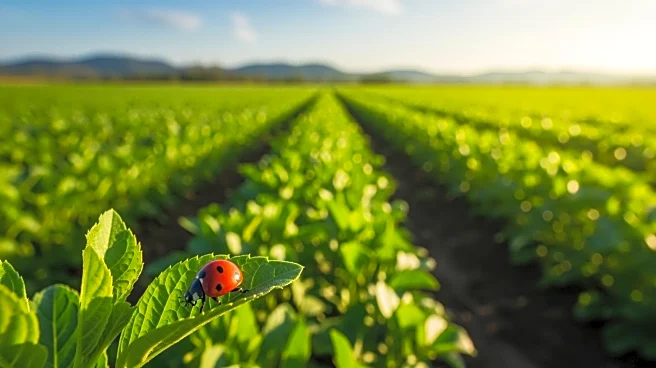What's Happening?
The global market for agricultural biologicals is projected to grow significantly, expanding from $14.2 billion in 2024 to over $29 billion by 2030, with a compound annual growth rate (CAGR) of 12.7%.
This growth is fueled by increasing regulatory pressures, awareness of soil degradation, and consumer demand for organically grown, residue-free food. North America leads the market with a 31.6% share in 2024, supported by a robust organic farming sector and substantial R&D investments. The Asia-Pacific region is expected to experience the fastest growth, driven by population growth, food security concerns, and government-backed initiatives promoting sustainable agriculture.
Why It's Important?
The expansion of the agricultural biologicals market is crucial for addressing environmental concerns and promoting sustainable farming practices. As regulatory pressures increase and consumer demand for organic products rises, the market is poised to support ecological health and improve crop resilience. This growth benefits stakeholders in the organic farming sector, including farmers, regulatory bodies, and consumers seeking healthier food options. The advancements in synthetic biology and microbial genomics further enhance product innovation, offering new solutions for sustainable agriculture.
What's Next?
The market is expected to continue its growth trajectory, with biopesticides and biostimulants leading the charge. Foliar sprays and seed treatments are anticipated to dominate applications, driven by the need for precise nutrient delivery and disease-resistant crops. As demand for organic produce increases, the fruits and vegetables segment is projected to achieve significant growth. Stakeholders, including agricultural companies and policymakers, will likely focus on enhancing regulatory frameworks and investing in R&D to support this expansion.
Beyond the Headlines
The growth of the agricultural biologicals market may lead to long-term shifts in farming practices, emphasizing sustainability and ecological health. Ethical considerations regarding the use of biopesticides and biostimulants will likely emerge, prompting discussions on balancing agricultural productivity with environmental preservation. The integration of AI in precision farming could revolutionize crop management, offering new opportunities for efficiency and innovation.










